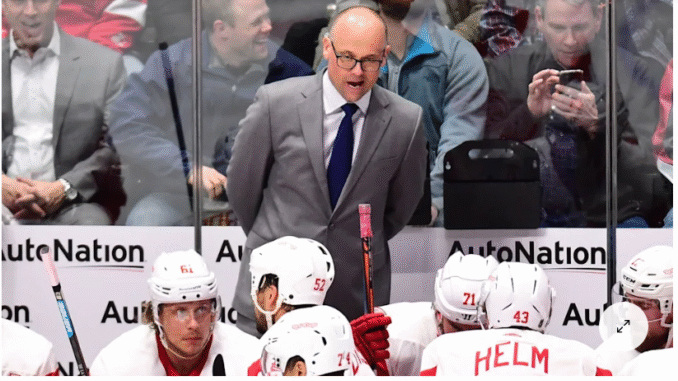
On Thursday, the Chicago Blackhawks officially named Jeff Blashill as the 42nd head coach in franchise history—confirming what had long been rumored. For hockey fans in the Midwest, Blashill’s name brings immediate associations with his seven-season tenure behind the Detroit Red Wings bench, a period marked by transition, turbulence, and the heavy burden of a once-mighty franchise in decline.
Now, Blashill finds himself with a new challenge—but one that, in many ways, mirrors the job he left behind. Can his second chance as an NHL head coach help reshape a struggling Blackhawks team into a contender once more?
A Familiar Road
Blashill’s coaching résumé is long and winding. He made his mark by leading the AHL’s Grand Rapids Griffins to a Calder Cup in 2013 before stepping into Detroit’s head coaching role in 2015. He replaced the polarizing Mike Babcock and inherited a team whose competitive window had just slammed shut. Over seven seasons, Blashill posted a 204-261-72 record—good for fifth-most games coached in Red Wings history—but failed to make a meaningful playoff run as the team endured the depths of a rebuild.
Many were quick to criticize his record, but few would argue he was handed a fair deck. With Detroit shedding aging veterans and lacking elite young talent for much of his tenure, Blashill often coached under constraints beyond his control.
Chicago’s Gamble
The Blackhawks, much like the Red Wings Blashill once led, are in the thick of a rebuild. The appeal of the job is obvious—2023 No. 1 overall pick Connor Bedard offers superstar potential, and the pipeline boasts names like Frank Nazar, Artyom Levshunov, and Oliver Moore. But the road back to relevance will be steep.
Chicago hasn’t reached 30 wins since 2019-20, and the current roster lacks the depth or defensive backbone to support sustained success. Goaltending is another question mark: Spencer Knight, acquired from Florida, could be the future in net—but that’s still more projection than proof.
Then there’s the clock. Bedard has just one year left on his entry-level deal, and while the Blackhawks aren’t expected to compete for a Cup anytime soon, the pressure to show progress is mounting. Patience may be preached, but urgency will dominate behind the scenes.
Lessons from Detroit—and Tampa
This time around, Blashill brings more than just NHL experience. Since leaving Detroit in 2022, he’s served as an assistant under Jon Cooper in Tampa Bay—one of the league’s most respected coaching minds. That mentorship could be pivotal. Cooper’s influence, combined with Blashill’s own hard-earned lessons, may make this version of Blashill more adaptable, more flexible, and more prepared to handle the pressures of a major hockey market.
Despite the challenges in Detroit, Blashill did show a knack for player development. Anthony Mantha and Tyler Bertuzzi, for example, played their best hockey under his guidance. If he can similarly elevate Bedard and the Hawks’ incoming youth, he’ll have already justified his hiring.
A Chance at Redemption
Chicago represents more than just a new opportunity for Jeff Blashill—it’s a second chance to rewrite his legacy. In Detroit, he was largely defined by losses that weren’t entirely his fault. In Chicago, he inherits another young team with growing pains ahead, but also with a core that could soon blossom into something formidable.
Blashill won’t transform the Blackhawks overnight. But if his time in Tampa taught him how to evolve, and if his player-first development style still resonates, he might just be the right person to steer this team through the next phase of its rebuild.
Whether this is the beginning of a coaching renaissance or a familiar story playing out again remains to be seen. But for now, one thing’s clear: Jeff Blashill is back—and he has unfinished business in the NHL.
Leave a Reply